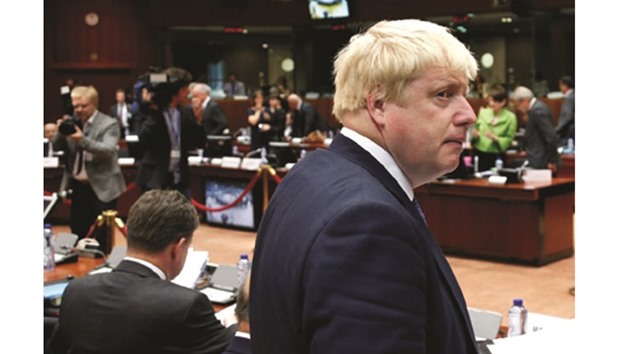Panic is gripping markets – stocks and bonds are falling, the pound is plumbing new depths, fears of recession are rampant – all because a slim majority of voters in the United Kingdom decided that the country should leave the European Union.
The British public has spoken and the die is cast. The UK’s new Prime Minister, Theresa May, will have to invoke Article 50 of the Treaty of Lisbon. Within two years, Britain will be officially out, like it or not.
But is all the market angst warranted? One could argue that the outlook is much less dire than most people realise. My advice is to take a deep breath and adopt the long view, because this story is far from over.
After all is said and done, the ending could in fact turn out to be surprisingly benign and, ironically, similar to what exists now.
The challenges ahead are obvious. The narrow majority for “Leave” implies that there are still many in Britain who deeply resent the idea of “Brexit”.
Start with “the City”, London’s Wall Street, which, despite the UK’s use of the pound rather than the euro, has long served as the EU’s pulsing financial centre and its gateway to the rest of the world’s markets.
With Britain out altogether, large sectors of the City’s business can be expected to migrate to new homes on the continent. The only question is which city will win the race to replace London. The most logical choice would seem to be Frankfurt, the home of the European Central Bank, but Paris and Amsterdam are also in the running.
Britain’s exporters are also unhappy because half of their sales are to fellow EU members. Nor should we forget the Scots and the Northern Irish, who voted overwhelmingly against Brexit and are now prepared to go to great lengths to preserve their membership in the European club.
Indeed, even some of the most enthusiastic Leave campaigners have shown signs of buyer’s remorse, now that the price of Brexit is becoming increasingly clear. Most notorious among them is Boris Johnson, the former London mayor who, just four days after the referendum, wrote a commentary in the Daily Telegraph titled: “I Cannot Stress Too Much That Britain Is Part of Europe – And Always Will Be”.
So, how can Britain uphold the democratic will of its voters and yet remain “part of Europe”, as the City and others would like? The answer is simple: It should muddle through. This shouldn’t be too hard in the end. This, after all, is the country that had, as the historian John Robert Seeley once wrote, “conquered and peopled half the world in a fit of absence of mind”.
Fortunately, the EU itself also has a proud tradition of muddling through the challenges it faces, long relying on messy arrangements to accommodate its various members’ needs and demands. The EU most likely would have collapsed early on had it not been for what The Economist has described as its “spirit of grubby compromise”. Where divergent interests cannot be easily reconciled, the EU has mastered the techniques of obfuscation and ambiguity to keep the beast lumbering forward.
Can such an arrangement now keep Britain in Europe? If I were a betting man, I would say yes. Policymakers know that despite the definitive wording of the Brexit referendum, the choice was never a simple “in” or “out.” Between those two poles is a host of possible compromises that would leave Britain an informal partner of the EU, even if no longer a formal member.
The most likely possibility that comes to mind is known as the “Norway option”. Norway is a member of the European Economic Area but it has access to the EU’s single market.
In return for that privilege, Norway contributes annually to the EU budget, agrees to play by all the bloc’s rules – even if it has no part in their formulation – and allows for the free movement of EU citizens. There is little reason to doubt that Britain could negotiate something along similar lines.
The easiest part to negotiate would be the annual contribution, which need not be very different from what the UK transfers to the EU now. Nor should it be difficult to find some way to give Britain an opt-out on any new EU rules, similar to what it already enjoys outside the eurozone under the banner of “vital national interests.”
The biggest stumbling block is immigration, which motivated so many Leave voters. But even here it isn’t impossible to imagine that diplomats might be able to fudge things enough to reach an agreement that even the Leave camp can stomach.
In short, there is a good chance that in two or three years, after the smoke has cleared, little will have changed between the UK and the EU in practical terms. As a strictly legal matter, Britain will no longer be an EU member. But, otherwise, life will go on much as it did before. The EU’s spirit of “grubby compromise” will have won out again. — Project Syndicate
The narrow majority for “Leave” implies that there are still many in Britain who deeply resent the idea of “Brexit”
*Benjamin J Cohen, professor of international political economy at the University of California, Santa Barbara, is the author, most recently, of Currency Power: Understanding Monetary Rivalry.

Britain’s Foreign Secretary Johnson attending an European Union foreign ministers meeting in Brussels this week. Johnson, one of the most enthusiastic Leave campaigners, just four days after the Brexit referendum, wrote a commentary in the Daily Telegraph titled: u201cI Cannot Stress Too Much That Britain Is Part of Europe u2013 And Always Will Beu201d.
